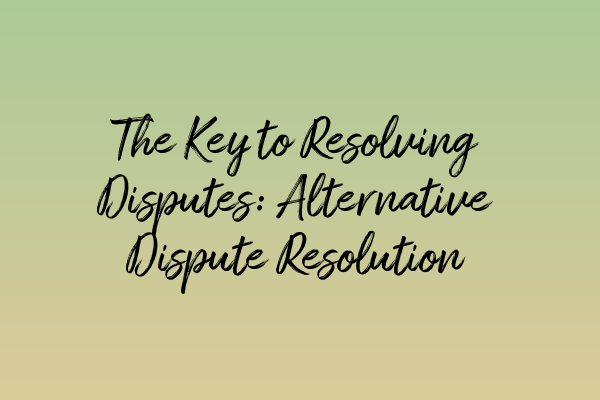The Key to Resolving Disputes: Alternative Dispute Resolution
In today’s fast-paced and complex world, disputes are inevitable. Whether it’s a contractual disagreement, a family dispute, or a business conflict, finding a resolution can often be a challenging and time-consuming process. Thankfully, there is an effective and efficient method that can help parties reach a mutually satisfactory outcome – Alternative Dispute Resolution (ADR).
While traditional litigation may be the first option that springs to mind when dealing with a dispute, it is not always the most practical or cost-effective solution. Litigation can be a lengthy process, involving court appearances, strict adherence to legal procedures, and high legal fees. Furthermore, litigation can strain relationships and leave the outcome in the hands of a judge or jury.
This is where Alternative Dispute Resolution comes into play. ADR refers to a range of processes and techniques that facilitate the resolution of disputes outside of the courtroom. Not only does ADR offer greater flexibility and control over the outcome, but it also encourages a more collaborative and amicable approach to conflict resolution.
There are several different methods of Alternative Dispute Resolution, each suited to different types of disputes and parties involved. Let’s explore some of the most commonly used ADR techniques:
1. Mediation: Mediation is a voluntary process where a neutral third party, known as a mediator, helps facilitate communication and negotiation between the parties. The mediator does not make any decisions but rather guides the parties towards finding a mutually acceptable resolution. Mediation is often used in family disputes, workplace conflicts, and commercial disputes.
2. Arbitration: Arbitration is a more formal process in which a neutral third party, known as the arbitrator, is appointed to hear the evidence and make a binding decision. Unlike mediation, arbitration results in a final and enforceable decision, similar to a court judgment. Arbitration is commonly used in commercial disputes, construction conflicts, and international disputes.
3. Negotiation: Negotiation is the simplest form of ADR, involving direct communication and bargaining between the parties to reach an agreement. Negotiation can be done independently or with the assistance of legal representation. It is a flexible and cost-effective method that can be applied to a wide range of disputes.
The benefits of Alternative Dispute Resolution are numerous. Firstly, ADR is generally faster than traditional litigation, allowing parties to resolve their disputes more promptly and get back to their lives or businesses. Secondly, ADR can be significantly more cost-effective, particularly when compared to the high legal fees associated with litigation. Parties can often save themselves time, money, and stress by opting for ADR.
Furthermore, ADR allows parties to have greater control over the outcome of their dispute. Instead of leaving the decision in the hands of a judge or jury, ADR allows the parties themselves to actively participate in finding a solution that meets their unique needs and interests. This can lead to more creative and customized resolutions that may not be available in a court setting.
Another advantage of ADR is its ability to preserve relationships between the parties involved. Litigation can often escalate conflicts and strain personal or business relationships. ADR, on the other hand, promotes open communication and collaboration, allowing parties to find common ground and strengthen their future interactions.
In summary, Alternative Dispute Resolution is a valuable tool for resolving disputes effectively and efficiently. Whether you are dealing with a family matter, a business conflict, or any other type of dispute, considering ADR is well worth your while. By exploring mediation, arbitration, or negotiation, you can take control of the resolution process and work towards a mutually satisfactory outcome.
If you’re interested in learning more about legal topics related to criminal law, cross-examination techniques, private prosecutions, ethical challenges in criminal defence, or assault and battery laws, check out the following articles:
– SQE Prep: Tips and Tricks to Excel in Criminal Law
– Cross-Examination Techniques: Mastering the Art of Questioning
– Private Prosecutions: Exploring Non-Governmental Prosecutions in Criminal Cases
– Ethical Challenges in Criminal Defence: Navigating Dilemmas
– Assault and Battery Laws: Understanding the Legal Parameters
Remember, when it comes to resolving disputes, Alternative Dispute Resolution can offer a more efficient, cost-effective, and amicable path forward. Consider exploring these methods to find the key to resolving your own disputes.


Leave a Reply